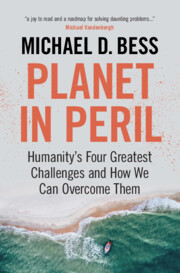Book contents
- Planet in Peril
- Reviews
- Planet in Peril
- Copyright page
- Dedication
- Epigraph
- Contents
- Fictional Vignettes
- Acknowledgements
- 1 Introduction
- Part I Existential Threats: The Four Most Pressing Dangers Facing Humankind
- Part II Strategies and Obstacles: The Solutions We Need, and What’s Preventing Them from Being Realized
- Part III Sensible Steps for Today’s World: Powerful Measures We Can Implement Right Away
- Part IV The Middle-Term Goal: New International Tools for the Late Twenty-First Century
- 14 A Promising Track Record: The Dramatic Growth of International Institutions and Networks Since 1900
- 15 How to Escape the Sovereignty Trap: Lessons and Limitations of the European Union Model
- 16 Taking the United Nations Up a Notch: Planet-Level Solutions for the Year 2100
- 17 The Other Path to 2100: Ruthless Competition, Fingers Crossed
- Part V The Long-Term Goal: Envisioning a Mature System of Global Governance for the Twenty-Second Century
- Endnotes
- Bibliography
- Index
15 - How to Escape the Sovereignty Trap: Lessons and Limitations of the European Union Model
from Part IV - The Middle-Term Goal: New International Tools for the Late Twenty-First Century
Published online by Cambridge University Press: 13 October 2022
- Planet in Peril
- Reviews
- Planet in Peril
- Copyright page
- Dedication
- Epigraph
- Contents
- Fictional Vignettes
- Acknowledgements
- 1 Introduction
- Part I Existential Threats: The Four Most Pressing Dangers Facing Humankind
- Part II Strategies and Obstacles: The Solutions We Need, and What’s Preventing Them from Being Realized
- Part III Sensible Steps for Today’s World: Powerful Measures We Can Implement Right Away
- Part IV The Middle-Term Goal: New International Tools for the Late Twenty-First Century
- 14 A Promising Track Record: The Dramatic Growth of International Institutions and Networks Since 1900
- 15 How to Escape the Sovereignty Trap: Lessons and Limitations of the European Union Model
- 16 Taking the United Nations Up a Notch: Planet-Level Solutions for the Year 2100
- 17 The Other Path to 2100: Ruthless Competition, Fingers Crossed
- Part V The Long-Term Goal: Envisioning a Mature System of Global Governance for the Twenty-Second Century
- Endnotes
- Bibliography
- Index
Summary
The pragmatic partnership among West European nations that has emerged since 1945 exemplifies how “win-win” strategies can bring powerfully beneficial results over time. Yet the EU model cannot be straightforwardly applied at the global level, for five reasons. First, the cultural and political differences among the world’s nations are much greater than they are within Europe. Second, the obscene divide between “haves” and “have-nots” is much starker and more intractable at the global level than it is within Europe. Third, rapid globalization has caused a political backlash in many nations, bringing to power leaders who seek a defensive retrenchment behind national walls. Fourth, global institutions of cultural integration, such as UNESCO, remain relatively weak. And fifth, racist prejudice and nativist xenophobia are on the rise in many nations. Nevertheless, the historical precedent set by the EU demonstrates that national sovereignty can be incrementally dismantled, yielding new forms of institutionalized cooperation among formerly separate and mutually hostile peoples.
Keywords
- Type
- Chapter
- Information
- Planet in PerilHumanity's Four Greatest Challenges and How We Can Overcome Them, pp. 212 - 232Publisher: Cambridge University PressPrint publication year: 2022



